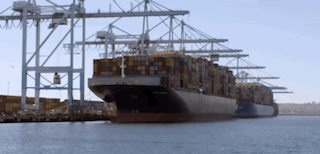- The Anxious Prepper
- Posts
- Fragile Trade 🌐 Rising Risks: How Global Supply Chains and Geopolitical Tensions Impact Us All
Fragile Trade 🌐 Rising Risks: How Global Supply Chains and Geopolitical Tensions Impact Us All
Exploring the Intersection of Supply Chain Vulnerabilities and Global Instability

Hello Everyone ,
This week, we’re focusing on global supply chain risks. From vulnerabilities in critical trade routes to the ripple effects of disruptions. Todays newsletter helps you connects the dots so that you can stay informed and prepared. Understanding these risks isn’t just about awareness, it’s about recognizing how they could impact everything from daily essentials to broader economic stability. Let’s dive in!
The Bigger Picture

Global Supply Chain Risks: Fragile Trade in an Uncertain World
Global supply chains have been face increasing threats as of late from a variety of interconnected drivers. Geopolitical instability, climate related disruptions, cybercrime, and rising costs of critical resources all come together to challenge the resilience of global trade. Recent incidents highlight how a single disruption can spread across industries, affecting food security, energy markets, and consumer goods.
Key chokepoints like the Red Sea, the Suez Canal, and the Taiwan Strait are increasingly vulnerable to instability. Meanwhile, the rising costs of freight, disruptions from extreme weather events, and resource scarcity paint a picture of global supply chains under immense strain.
Key Insight: Global supply chains are under immense pressure, with disruptions in one region quickly rippling across industries and economies worldwide.
Why It Matters: A better understanding of these risks empowers businesses and individuals like you and I to better anticipate potential shortages and rising costs.
🌟 What You Can Do: Stay informed about geopolitical risks, keep an eye on key trade routes, and stock up on essentials to mitigate potential disruptions. Diversify your sources for critical items like food, medicine, and household supplies to reduce reliance on vulnerable supply chains.
Deep Dive: Major Risks Facing Supply Chains in 2025
1. Geopolitical Instability: The Red Sea and the Houthis (80% Risk Score)
The Houthis’ control of Yemen’s western coast and the Bab al-Mandab Strait has made the Red Sea a critical flashpoint for global trade. Supported by Iranian weapons and Russian intelligence, the Houthis have disrupted shipping with missile strikes, hijackings, and illegal fees, costing the global economy $200 billion in 2024 alone.
Economic Costs: Cargo volumes through the Bab al-Mandab Strait have dropped by around two thirds. Ships rerouting around Africa face between 10-14 day delays and burn $1 million more in fuel per voyage. Freight costs from Shanghai to Rotterdam have increased by about 5x since 2023.
Ripple Effects: Higher costs for goods like oil, wheat, and electronics are felt globally, while Chinese vessels enjoy reduced insurance costs due to geopolitical ties.
Geopolitical Imbalances: Western firms face disproportionately higher premiums, with some vessels paying 20 times normal rates for insurance.
2. Climate Change-Driven Flooding (90% Risk Score)
Increased frequency and intensity of floods continue to disrupt infrastructure, from bridges to supply routes. A single event like Hurricane Helene in Appalachia impacted over 50 manufacturers across electronics, aerospace, and medical industries.
3. Cybercrime in Supply Chains (75% Risk Score)
Sub-tier suppliers are increasingly vulnerable to cyberattacks, which ripple upward into top-tier corporations. Attacks were especially common in industries like electronics, logistics, and consumer goods in 2024.
4. Rare Minerals and Metals Restrictions (65% Risk Score)
Scarcity and geopolitical restrictions on key minerals like graphite for EV batteries drive up costs and challenge sourcing strategies.
5. Crackdown on Forced Labor
Legislation like the U.S. Uyghur Forced Labor Protection Act disrupts shipments and forces companies to scrutinize supply chains for ethical violations. The complexity of sub-tier suppliers increases the difficulty of compliance.
🌟 Takeaway: The interplay of geopolitical, environmental, and cybersecurity risks creates compounding threats to global supply chains. Policymakers and businesses must collaborate to secure critical trade routes and improve supply chain resilience.
Quick Hits: This Week’s Key Updates

🔹 South Africa Mine Disaster: Over 100 Feared Dead
Rescuers are working to retrieve survivors from South Africa’s Buffelsfontein Gold Mine, where more than 100 illegal miners are believed to have died from starvation or dehydration after months underground. Cellphone videos show desperate pleas for help and evidence of dire conditions.
Why It Matters: Highlights the humanitarian crisis tied to illegal mining and the challenges of addressing unregulated industries globally.
🔹 Questions About Syria and ISIS Resurgence Loom for Trump
President-elect Donald Trump faces critical decisions on whether to withdraw U.S. troops from Syria or maintain a presence to prevent an ISIS resurgence. Experts warn that U.S. withdrawal could leave Kurdish allies vulnerable and allow ISIS to re-establish its stronghold, with potential global consequences.
Why It Matters: Highlights the fragile situation in Syria and the risks of terrorism spilling into the West through online propaganda and lone-wolf attacks.
🔹 Gaza Ceasefire Delayed Amid Tensions Over Hostage List
The long-awaited ceasefire in Gaza was delayed as Israeli Prime Minister Benjamin Netanyahu demanded a list of the first hostages to be freed under the deal with Hamas. Thirty-three Israeli hostages, including two Israeli Americans, are set to be released in exchange for 737 Palestinian prisoners and 1,167 others detained in Gaza.
Why It Matters: The ceasefire reflects fragile negotiations and ongoing humanitarian challenges, with intensified airstrikes in Gaza killing at least 120 people since the deal was announced.
What This Means for You 🌍
🌐 Global Supply Chains: Make sure you prepare for potential supply chain disruptions by diversifying the sources of essential goods, including food, medicine, and household supplies. Keep an eye on geopolitical developments, particularly in key trade chokepoints like the Red Sea, and stock up on non-perishable items to mitigate delays.
⚠️ Syria and ISIS Risks: While there’s little immediate action individuals can take regarding the situation in Syria, staying informed about U.S. policy decisions and the global implications of a potential ISIS resurgence is key to understanding broader security risks.
🕊️ Gaza Ceasefire: The ceasefire between Israel and Hamas is a vital step in addressing Gaza’s humanitarian crisis, allowing aid to reach those in need. However, its fragility underscores the risk of renewed conflict, with potential ripple effects on neighboring regions and global stability. Supporting credible relief efforts and staying informed are key ways to promote stability and preparedness.
Stay Tuned 🔍
Stay tuned for more powerful insights into global risks and strategies to stay prepared in an ever evolving world. Each edition brings clarity to complex issues, from supply chain vulnerabilities to geopolitical shifts, providing you with actionable takeaways to navigate uncertainty with confidence.
Don’t miss a single update, subscribe below 👇 and take the first step in staying ahead of global challenges. Gain access to timely insights, actionable strategies, and a deeper understanding of the risks shaping our world. Your journey to staying informed and prepared starts here❗️